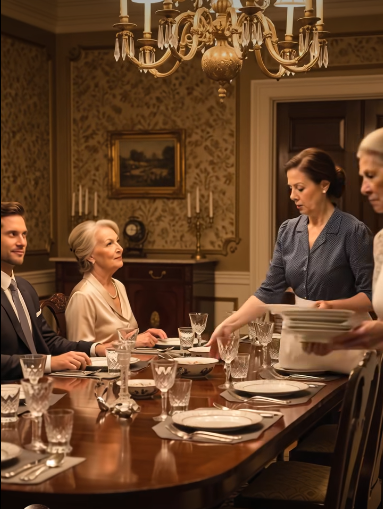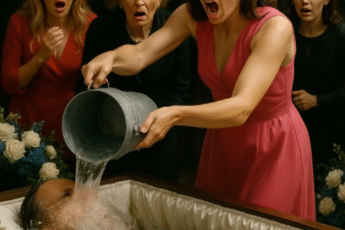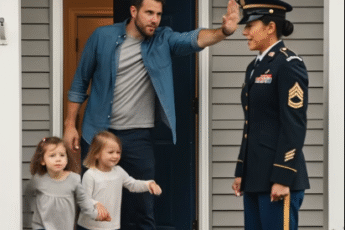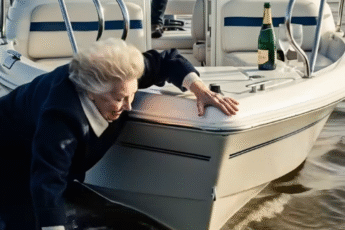The words echoed in my mind, a chilling pronouncement from my mother-in-law, Clare, delivered with practiced precision across our dining room. “Well, at least Paige knows her place in the kitchen. Some people are just natural helpers, aren’t they?” She’d said it casually, as if commenting on the weather, while my mother, Paige, stood frozen in the doorway, holding the casserole she’d spent all morning preparing. Three hours ago.
Now, at 5:30 a.m., I was in my own kitchen, meticulously preparing my husband Dustin’s breakfast. The eggs sizzled in the pan, a mundane sound that barely masked the replay of Clare’s words. “Natural helpers.” The phrase lodged in my chest like shrapnel. My mother had worked in a hospital cafeteria for twenty-three years, not because she was a “natural helper” in Clare’s dismissive sense, but because she needed to feed her children after my father died. She’d memorized every doctor’s coffee order, learned the names of every janitor’s grandchildren, and somehow managed to save enough from her modest earnings to help me through community college. “Natural helper.” The words tasted bitter as I flipped Dustin’s eggs. He liked them over easy, yolk intact. Wheat toast golden, never brown. Coffee with exactly one sugar stirred three times counterclockwise.
Three years of marriage had taught me that the Hayes men had specific requirements for everything: the right temperature for their shower water, the right thread count for their sheets, the right kind of wife who knew when to speak and when to disappear. I’d learned to meet those requirements, to fold myself into smaller and smaller spaces until I barely recognized the woman staring back from the microwave’s reflection.
“You’re up early,” Dustin said, entering the kitchen, adjusting his tie. He didn’t kiss me good morning anymore. Hadn’t for months. Physical affection was reserved for public displays at country club events where other powerful couples might notice.
“Your breakfast is ready,” I said, plating his food with the precision of someone defusing a bomb. One wrong move, one slightly overcooked edge, and the entire morning would derail into a lecture about “standards” and “maintaining the Hayes reputation.”
He sat at the breakfast bar, scrolling through his phone while eating. The silence between us had weight and texture, filled with all the things we no longer said. I watched him eat the breakfast I’d prepared and thought about how my mother used to make us pancakes shaped like hearts on Sunday mornings. How she’d sing while cooking, how food was love in our house, not performance.
“Mother wants to discuss the weekend dinner arrangements,” he said without looking up. “She’s invited the Brennans. You know how important they are to the firm.” The Brennans: old money, a Denver family whose approval could make or break careers in this city. Of course, Clare would want to impress them. And of course, that would mean my mother would spend the evening in the kitchen, preparing food she wouldn’t be invited to eat, serving people who wouldn’t acknowledge her existence except to criticize the temperature of their soup.
“Will my mother be joining us for dinner?” I asked, though I already knew the answer.
“She’s welcome to help with preparations,” Dustin said, which was Hayes-speak for “no, she would not be sitting at the table.” She would be standing behind it, refilling water glasses and clearing plates while everyone pretended she was invisible.
By 10:00 a.m., I’d cleaned the breakfast dishes, arranged fresh flowers, and was reviewing our social calendar when I heard a tentative knock. Through the peephole, I saw my mother with grocery bags, the generic store logos practically glowing against the manicured backdrop of our exclusive neighborhood.
I opened the door quickly, ushering her inside before Mrs. Patterson, our nosy neighbor, could document this breach of the neighborhood’s unspoken economic standards. “Found chicken on sale,” Mom announced, lifting the bags with a pride that broke my heart. “Two for the price of one. Thought you might use it for that fancy dinner.” She was wearing her good cardigan, the navy one she saved for important occasions. Visiting her daughter now required that level of formality.
“Sandra’s daughter just got into State,” she said, unpacking the chicken with careful hands. “Full academic scholarship. Can you imagine?” She glowed with secondhand joy, the kind that came from celebrating other people’s children because one of hers, my brother Marcus, had vanished seven years ago, and the other, me, had transformed into someone who flinched when her mother used the wrong fork at dinner.
Mom reached for a cabinet, then hesitated. “The plates are in the upper right now,” I said gently, though we both knew that wasn’t what made her hesitate. It was the entirety of this kitchen, with its Sub-Zero refrigerator and wine cooler and gadgets that cost more than her monthly rent. She didn’t belong here, and we both felt it.
She looked around the kitchen, her eyes lingering on the German steel knife block, the eight-hundred-dollar mixer, the copper pots. When she looked back at me, her smile was forced and fragile. “I should have called first,” she whispered.
“Mom, you never need permission to visit your daughter.” But the words rang hollow in this house where everyone needed permission for everything.
That evening, Dustin burst through the door, champagne in hand, his face bright with triumph. “Senior Partner!” he shouted, lifting me off my feet in a spin. “Youngest in the firm’s history!” For a fleeting moment, I was twenty-three again, in love with a man who promised me the world. This was what he’d worked for, what he’d sacrificed everything to achieve, including parts of us I hadn’t realized were negotiable.
“That’s wonderful,” I said, and almost meant it entirely.
“Mother insists on a proper celebration this weekend. The entire family, plus a few key clients.” “Proper.” The Hayes family had turned that word into a weapon. My mother’s accent wasn’t proper. Her clothes weren’t proper. Her existence at their dinner table wasn’t proper. But her food was proper enough to serve. Her labor was proper enough to exploit.
That night, after Dustin had fallen asleep, my phone rang. Mom’s picture appeared on the screen. “I’m sorry to call so late, baby,” her voice was thick with tears. “I saw him on the news. That tech conference in Seattle. Looked just like Marcus.”
My chest tightened. Seven years of false hopes. “Did you get a good look?”
“They only showed him for a second. But Haley, I swear it was him. He had that same little scar above his eyebrow.” She scrolled through photos of Marcus on her tablet, a digital shrine to the son who’d promised to come back. “Seven years, baby,” she whispered. “Seven years without my boy. Did I do something wrong?”
“Mom, no. Never think that.” But even as I comforted her, I wondered if I was following Marcus’ path, erasing myself piece by piece, becoming someone our mother couldn’t recognize. “Who are you talking to?” Dustin’s voice called from the bedroom, irritated.
“Just reviewing tomorrow’s schedule,” I lied smoothly. Another surrender. After mom hung up, I sat in the dark living room, surrounded by things that weren’t really mine, wondering how many more times I could watch my mother’s dignity get stripped away before something inside me finally shattered.
Friday arrived with the weight of dread. Clare’s calls began at 8:00 a.m. “Remember, Haley, the Waterford crystal for water, the Baccarat for wine. And please ensure the silver is actually polished this time.” I agreed, browning meat for Mom’s pot roast recipe. The smell filled the kitchen with memories, memories of a home where happiness wasn’t measured in crystal classifications.
Mom arrived at 4:00 p.m., an hour before anyone else, carrying an apple pie. She stood at my door in her best dress, the navy one she’d found at a secondhand store and altered. “I brought dessert,” she said, holding up the pie.
Before I could respond, Clare’s Mercedes pulled into the driveway. “Paige, how punctual,” Clare said, her gaze traveling from Mom’s hair to her discount store shoes. “Actually, this works perfectly. You might be more comfortable helping in the kitchen while we set up.” The dismissal was delivered with a smile that never reached her eyes. Mom’s shoulders dropped slightly, but she nodded, already moving toward the kitchen.
Faith, Dustin’s sister, arrived next. “Is that your mother’s car?” Faith asked, pointing to Mom’s fifteen-year-old Honda. “So authentic. Very working-class chic.” She laughed at her own joke, examining Mom’s pie. “Homemade, how quaint.”
The dinner began at 7:00, everyone seated except Mom, who stood by the kitchen door like a waitress. I’d set a place for her, but Clare had removed it while I was getting wine. As we settled into the first course, Faith’s friend, Margaret, leaned toward Faith and whispered, loud enough for the entire table to hear, “Is that the help? She looks familiar.”
“That’s Haley’s mother,” Faith replied with amusement. “She helps out sometimes.”
Mom had just reached for her water glass, using the wrong hand, picking up the wrong fork. Clare’s laugh tinkled through the air like breaking glass. “Oh, Paige,” she said with exaggerated patience, “formal dining must be so overwhelming for you. The fish fork is the smaller one on the outside. Though I suppose in your usual dining situations, one fork does everything.” The table erupted in polite laughter while Mom’s face flushed deep red. She set down the fork carefully, her hands disappearing into her lap. Dustin’s hand found mine under the table, his grip a tight warning.
Between courses, I escaped to the kitchen and found Mom in the bathroom, red wine spreading across her dress. “Just an accident,” she insisted, dabbing at the stain. But I’d seen Faith’s “accidents” before. “I’m ruining everything,” Mom whispered. “I shouldn’t have come. I don’t belong here.”
“Here,” I said, pulling off my cashmere cardigan. “Wear this.” The sweater covered the stain but couldn’t hide the defeat in her eyes. I wanted to burn the house down.
Later, as Dustin and I prepared for bed, I finally spoke. “Your mother was hurt tonight.”
He sighed. “She needs to understand her place in this family. Haley, she’s not a Hayes.”
“She’s my mother.”
“You’ve adapted beautifully to our world. You learned the rules. Why can’t she?” The casual cruelty of his words stole my breath. “I loved you enough to help you become better than where you came from.”
I lay awake, replaying every humiliation. Mom’s phone lit up with a text: Thank you for dinner. Sorry about the dress. I’ll wash your sweater and return it next week. Even now, she was apologizing for the wine Faith had spilled. “I love you, Mom,” I typed. “You have nothing to apologize for.” It was a lie. In the Hayes world, she had everything to apologize for. And I had become complicit through my silence. Something had to change. Something had to break.
Monday morning, I drove to Mom’s apartment to begin preparing for Dustin’s partnership celebration. She hummed with anticipation, convinced her cooking would finally show them her worth. “They’re going to love this,” she said with such hope it made my stomach hurt.
Thursday afternoon, Clare’s catering van pulled into my driveway. “Oh, Paige, you cooked?” Clare announced, noticing Mom’s carefully labeled containers. “How unnecessary! We have more than enough from the caterers.” Mom’s face fell, her homemade pie pushed to the side, forgotten.
The party began at 6:00. Mom stood near the kitchen door, in her best dress, waiting for direction. Clare swept past her. “These are from Lemoine,” she announced loudly, presenting the caterer’s appetizers. “Only the best for Dustin’s celebration. Though Paige insisted on helping; she’s so comfortable in kitchens, aren’t you, dear?” Mom retreated.
Later, I watched Mom attempt to join a conversation. Faith materialized beside her. “But you’ve never been anywhere, have you?” Faith’s voice carried. “I mean actual travel, not just watching the Travel Channel.” The women tittered. “Probably somewhere with a nice kitchen to work in,” Faith interjected. Dustin stood three feet away, watching, and laughed.
The kitchen became a war zone. Mom tried to help, but was treated like an intruder. As she reached for a tray, Clare’s sharp voice cut through the chaos. “Paige, the shrimp tray needs refilling quickly. Now, the partners are waiting.” Mom spun, her hand catching a sheet pan fresh from the oven. The sound she made was small, swallowed quickly, but I saw her whole body tense with pain. Dustin materialized at my elbow. “Don’t make a scene,” he hissed. “Not tonight.”
I found Mom in the guest bathroom, running cold water over an angry red burn. “They’re ruining you,” I said.
“Don’t say that,” she insisted. “This is your life now. Your good life. I can handle a little burn.”
But it wasn’t just the burn. It was everything. I helped her fix her makeup, watched her practice smiling, then sent her back to serve. I escaped to the powder room. My phone sat heavy in my purse. I pulled up Marcus’s last known number. This is Haley. They’re destroying Mom. My finger hovered over send. No taking it back. I hit send. The message showed as delivered. Nothing.
Twenty minutes later, my phone buzzed. Tomorrow night, family dinner. I’ll handle everything. Five words that changed everything. My brother hadn’t forgotten.
Sleep never came. Friday morning, Dustin announced, “We need to have another family dinner tonight. Judge Harrison might stop by. Mother wants to ensure we make the right impression.”
“We should host here,” I said, surprising myself with the steadiness of my voice. “Our apartment, more intimate.”
“You want to host?” he asked, eyebrows raised. “After that disaster with the caterers last night?”
“I’ll handle everything.”
He studied me, cataloging the changes. My straight spine, my direct gaze. “Fine, but everything needs to be perfect.”
I spent the afternoon preparing with meticulous care. Not elaborate place settings, but Mom’s pot roast recipe, regular plates, open windows. For the first time, I prepared my home like it was mine. Mom arrived at 6:30, wearing the navy dress, but with new silver earrings, her hair styled differently. “How do I look?” she asked.
“You look perfect.”
At 7:00 sharp, the Hayes family arrived en masse. “Paper napkins, Haley? Really?” Clare began. “And you’re serving pot roast. How rustic.” Faith, Harold—Dustin’s father—all expressed disdain. Mom automatically moved toward the kitchen, but I caught her hand. “Sit,” I said loud enough for everyone to hear. “You’re a guest.”
As we began eating, the usual performance started. Clare commented on the “aggressive” seasoning. Faith mentioned pot roast was “so heavy, so working-class.” Harold delivered a lecture on “maintaining standards.” I watched the clock. 7:15, 7:30, 7:45. My hope began to feel like delusion.
At 7:58, Clare launched into her favorite topic. “Some people are meant to serve, and there’s honor in that. Take you, Paige. You found your place in food service. It suits you. Some people are just naturally meant for kitchens.”
Faith leaned forward. “Speaking of kitchens, shouldn’t you be in ours? I mean, that’s where you’re most comfortable, isn’t it?”
The clock on the mantle showed 8:00 exactly. That’s when we heard it. Footsteps. Heavy, confident. The doorknob turned. The door swung open before anyone could respond, crashing against the wall. Faith had just finished saying, “She’s nothing but a servant.”
A figure stood silhouetted in the doorway. Then he stepped into the light. The man who entered my dining room commanded the space with an authority that made the air itself feel heavier. He wore a charcoal suit, tailored to perfection. Italian leather shoes reflected the overhead lights. “Who dares insult my family?” The voice wasn’t loud, but it rolled through the apartment like a physical force. His eyes swept the room. Dark, intense, older than I remembered, but unmistakably familiar. Marcus.
Dustin’s fork clattered to his plate. “Mr. Marcus Morrison?” he stammered, his voice cracking. “The Morrison Industries Marcus Morrison?” The transformation in the room was instant. Harold shot upright. Clare’s mask shattered. Faith scrambled backward. Everyone knew the name. Marcus Morrison: the mysterious CEO, the “ghost billionaire,” who had revolutionized cloud computing. And he was standing in my apartment, looking at me with eyes that held seven years of apology.
“Hello, little sister,” he said, his voice softening just for those three words. Clare’s wine glass slipped from her fingers, shattering on the floor. Faith’s phone fell. Preston actually whimpered.
“Marcus,” Mom whispered, a prayer.
He crossed the room in three strides, dropping to his knees beside her chair, no regard for his expensive suit. His hands, steady and strong, reached for hers. “Mom,” he said, and his voice broke. “I’m sorry. I’m so sorry.” She touched his face, tracing the scar above his eyebrow, feeling the reality of him. Then she collapsed forward into his arms, sobbing. “My boy,” she kept saying. “My boy came home.”
The Hayes family sat frozen, watching their world reconstruct itself around a new reality. Harold recovered first. “Mr. Morrison, we had no idea. Your family never mentioned—”
“My family,” Marcus said, still holding our sobbing mother, “never mentioned me because you never gave them the chance to be anything more than servants in your eyes.” He helped Mom back into her chair, then stood, his gaze moving from one Hayes face to another. When his eyes landed on Dustin, they narrowed. “You,” he said, the single word containing volumes. “You married my sister.”
Dustin nodded frantically. “Yes, I—we—I didn’t know she was—I mean, I knew she had a brother, but not—not you.”
“Not me,” Marcus repeated slowly. “Would it have mattered? If I was still Marcus Morrison from the wrong side of Denver, would you have treated them any differently?” The question hung in the air, unanswered, because everyone knew the truth.
Faith tried to shrink, but Marcus’s attention had shifted. “You called my mother a servant, said she belongs in the kitchen.”
“I didn’t mean—” Faith started.
“You meant exactly what you said.” His voice was calm, conversational, which made it more terrifying. “You’ve meant every cruel word, every dismissive gesture, every deliberate humiliation you’ve inflicted on them for three years.”
Clare found her voice, though it shook. “This is all a misunderstanding. We’ve always welcomed Paige and Haley into our family.”
“Welcomed?” Marcus pulled out his phone. “Should I read the text you sent your son last week? The one about keeping the help in the kitchen during important dinners? Or would you prefer I share the email where you called my sister a charity case you were ‘civilizing’?”
Clare’s mouth fell open. “How did you?”
“Morrison Industries handles your firm’s entire digital infrastructure,” Marcus said simply. “Every email, every text, every cruel word you thought was private. I have it all.” The implications rippled through the room. Harold’s face went gray. Dustin looked sick.
I watched Mom. She sat straighter, her tears drying, something returning to her eyes that had been missing for three years. Pride. My brother hadn’t just come home. He’d come home as someone who could defend her, protect her, restore everything they tried to take from her.
“Now,” Marcus said, his voice dropping to that dangerous quiet that used to precede his worst revenges against neighborhood bullies. “Let’s discuss exactly what you’ve been doing to my family.”
Marcus moved toward Mom with deliberate calm, kneeling beside her again. That’s when he saw it: the bandage, spotted with blood. “How did this happen?” he asked softly, carefully unwrapping it. The burn was angry and blistered.
“It’s nothing, just a little kitchen accident,” Mom insisted.
“At the partnership party,” I interrupted, “She was rushing to refill appetizers because Clare commanded it. She burned herself on a hot pan, and when I tried to help her, Dustin told me not to make a scene.”
Marcus’s head turned slowly toward Dustin. The temperature in the room seemed to drop. When he stood, he moved with controlled precision. “You made my mother cook for you? Called her a servant? And when she injured herself serving you, you were more concerned about appearances than her pain?”
Dustin raised his hands defensively. “Now wait, I never meant—”
The punch cut off his excuse. Marcus’s fist connected with Dustin’s jaw with a crack that echoed through the apartment. Dustin toppled backward, chair clattering, blood streaming from his split lip and what looked like a broken nose. Clare screamed. Faith pressed herself against the wall.
“The next person who moves or speaks without permission will regret it,” Marcus said conversationally, stepping over Dustin’s groaning form. He pulled out his phone again. “Let’s discuss your crimes properly. Three years of psychological abuse directed at my sister, forcing her to abandon her counseling career, systematic isolation from friends and support systems, financial control through joint accounts you monitor obsessively.” He looked at Dustin. “Should I continue?”
“You can’t prove any of that,” Harold said weakly.
Marcus smiled. “Morrison Industries processes forty percent of this state’s digital infrastructure. Your firm uses our servers. Every email Harold Hayes has sent about keeping the help in line. Every text Clare sent about civilizing the charity case. Every cruel joke Faith shared about my mother’s ‘servant mentality.’ I have it all. Three years of documented cruelty, archived and admissible.”
“Here’s what’s going to happen,” Marcus continued, his tone shifting to pure business. “First, immediate apologies. Real ones. Second, Haley returns to her counseling career with full support, including a public statement from the Hayes family about how proud they are of her work with troubled youth. Third, my mother becomes an honored member of this family. Not tolerated, not allowed. Honored.”
“That’s extortion,” Harold said weakly.
“That’s negotiation,” Marcus corrected. “I haven’t reached extortion yet. Would you like me to?”
“The masterpiece,” Marcus continued, “will be the charity gala. Two weeks from now, the Hayes family will host a celebration in honor of Paige Morrison. Five hundred of Denver’s most influential people will hear you toast her as a remarkable woman who raised two successful children against impossible odds. You’ll establish a scholarship in her name for underprivileged students. You’ll ensure every society page covers the event.”
“You can’t force us,” Clare started.
“I can destroy you,” Marcus interrupted smoothly. “Your husband’s firm depends on contracts I could terminate tomorrow. Your son’s partnership exists because Judge Harrison, who owes me several favors, recommended him. Your daughter works for a company that Morrison Industries could buy and dissolve before lunch. One word from me, and the Hayes family becomes radioactive in Denver society.”
Then he turned to Mom. “Mom,” he said gently, “what do you want to say to them?”
Mom stood slowly. For the first time in three years, she didn’t hunch her shoulders. She looked at each Hayes face. “I forgive you,” she said, and the words landed like another punch. “Not because you deserve it, but because I refuse to carry your poison anymore. I forgive you, but I’ll never forget. Every cruel word, every dismissive gesture, every time you made me feel like less than human, I’ll remember it all.” She walked over to Dustin. “You could have had a mother-in-law who would have loved you like her own son. Instead, you chose this.”
She turned to me, her eyes bright with tears and liberation. “Haley, my beautiful girl, you don’t have to apologize for them anymore. You don’t have to make yourself small to fit their expectations. You are not their project to improve. You are my daughter, and you are perfect exactly as you are.”
Three years of suppressed tears came flooding out as I stood and went to her, feeling Marcus’s hand on my shoulder, steady and protective. “Sorry because you’re caught,” Marcus said coldly. “Sorry because there are consequences. But are you sorry for the pain you caused? For the dignity you stole? For the family you tried to destroy?” The silence was answer enough.
“Two weeks,” Marcus said finally. “The gala will be perfect, or I’ll dismantle your lives piece by piece. Every slight against my family will be repaid with interest. Every humiliation will be returned tenfold.”
Harold cleared his throat. “If we do this, if we meet your terms, then what?”
“Then you get to keep your wealth, your reputation, your positions. You get to continue living your privileged lives. But you’ll do it knowing that your fortune, your comfort, your entire existence depends on the ongoing mercy of the woman you called a servant.”
Dustin struggled to his feet. “Haley, please, you’re my wife.”
“Am I?” I heard myself say, my voice stronger than it had been in years. “Because wives are partners, equals, not projects to be improved or embarrassments to be managed.”
Six months had passed. My counseling office on the third floor of a community health center overlooked a playground. Marcus appeared in the doorway, carrying bags from Goldberg’s Deli. This was our Tuesday and Thursday tradition.
“Mom held court at Le Bernardin last night,” he said, unpacking pastrami sandwiches. “The maître d’ knows her life story now.”
“Did she show them photos?” I asked, laughing.
“The entire graduation album. The server knew my GPA, my scholarship details.” He shook his head, smiling warmly. “She told them about your first client here, too. The kid who wouldn’t talk to anyone else, but opened up to you.”
“How’s the divorce proceeding?” Marcus asked. Dustin had been cooperative. “He asked for another chance yesterday,” I continued. “He said he finally understands who I really am, that he sees my value now.”
“He sees your value because of you,” Marcus said gently. “Because you’re Marcus Morrison’s sister, not because you’re Haley.”
“I’m learning that.”
Sunday arrived with its new ritual. Marcus and I drove to Mom’s apartment. She had refused all offers of a new house. “This is home,” she’d said simply. So Marcus had bought the building, renovated every unit, and reduced rent for all tenants. Mom didn’t know she was living rent-free.
Her apartment smelled like pot roast and fresh bread when we arrived. “Dinner’s almost ready!” she announced, then launched into her latest news. “Faith Hayes actually said ‘please’ when she called yesterday! And Clare sent another gift basket. I donate them to the food bank.” She showed us photos from recent events: at the opera, at a museum opening, at a hospital fundraiser. “This one’s my favorite though,” she said, showing us a photo from her weekly volunteer shift at the community center. She was surrounded by kids, teaching them to cook.
“That’s the real you,” I said.
“All of it’s the real me now,” she corrected. “I’m not choosing between worlds anymore. I can serve soup at the shelter on Tuesday and attend the symphony on Saturday. I can be both.”
Wednesday afternoon, Dustin arrived for our final therapy session. “I tried to erase where you came from instead of embracing it,” he said. “I see that now.”
“Because Marcus showed you,” I said quietly.
“At first, yes, but then I started actually paying attention. Your mother’s strength, your compassion with clients, the way you never gave up on people, even when they disappointed you. Even when I disappointed you.”
It was the closest thing to a real apology I’d gotten, but it was too late. I wanted us to end this with dignity. He nodded slowly. “I can do that. I owe you that much.”
As I drove to pick up Mom for Marcus’s company gala, I reflected on the strange journey. The Hayes family still existed in our periphery, diminished, humbled. They attended every event honoring Mom, contributed to her scholarship fund, and treated us with exaggerated courtesy. But they were no longer the center of my universe.
I pulled into Mom’s apartment complex. She was waiting at her window, wearing a midnight blue designer dress she’d bought with her own money. She’d started a small catering business. When she saw my car, she waved, standing tall and proud. This was what victory actually looked like. Not their destruction, not even Marcus’s dramatic return, though having my brother back was a gift I treasured daily. Victory was my mother standing in her window, wearing a dress she chose herself, about to attend a gala where she’d be introduced as Marcus Morrison’s mother and Haley Morrison’s inspiration. Victory was reclaiming our names, our stories, our worth.
As Mom got into my car, adjusting her dress, she looked at me with eyes that sparkled with hard-won peace. “Ready?” I asked.
“I’ve been ready my whole life,” she said. “I just didn’t know it until now.”
We drove toward downtown, toward Marcus’s building, where he waited to escort his mother into a room full of people who would see her for exactly who she was: a woman who’d raised two children to understand that love wasn’t about power or position or possession. Love meant showing up for the people who matter, even if it takes seven years to find your way back home.





